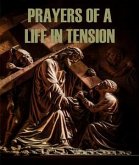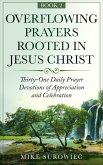Spirituality is lived belief. When we pray, worship, or reach out to our neighbors, we live out our beliefs. Our beliefs structure our spirituality like skin stretched over the bones of our bodies.
These beliefs start with faith in God the Father through Jesus Christ as revealed through the Holy Spirit in scripture, in the church, and in daily life. Our Trinitarian theology orders our beliefs. Without a coherent theology, we lose our identity in space and time having no map or compass to guide us on our way. In the end, we focus on ourselves, not God.
Christian spirituality starts with God, not with us.
Prayers takes the form of 50 prayers taken from A Christian Guide to Spirituality.
Reading A Christian Guide to Spirituality will help readers understand Christian spirituality better and nurture their faith. There is no such thing as quality time with the Lord; there is only time. The living God speaks to us in many ways, but especially through scripture. These three sources cited (Apostle's Creed, Lord's Prayer, and Ten Commandments) are commonly called the "rule of faith" (regula fidei) and were utilized for nearly two millennia as a means to apprentice the faith. These sources are the heart of the confessions of most Christian faith communities and denominations.
Hear the words; walk the steps; experience the joy!
These beliefs start with faith in God the Father through Jesus Christ as revealed through the Holy Spirit in scripture, in the church, and in daily life. Our Trinitarian theology orders our beliefs. Without a coherent theology, we lose our identity in space and time having no map or compass to guide us on our way. In the end, we focus on ourselves, not God.
Christian spirituality starts with God, not with us.
Prayers takes the form of 50 prayers taken from A Christian Guide to Spirituality.
Reading A Christian Guide to Spirituality will help readers understand Christian spirituality better and nurture their faith. There is no such thing as quality time with the Lord; there is only time. The living God speaks to us in many ways, but especially through scripture. These three sources cited (Apostle's Creed, Lord's Prayer, and Ten Commandments) are commonly called the "rule of faith" (regula fidei) and were utilized for nearly two millennia as a means to apprentice the faith. These sources are the heart of the confessions of most Christian faith communities and denominations.
Hear the words; walk the steps; experience the joy!
Dieser Download kann aus rechtlichen Gründen nur mit Rechnungsadresse in A, D ausgeliefert werden.









